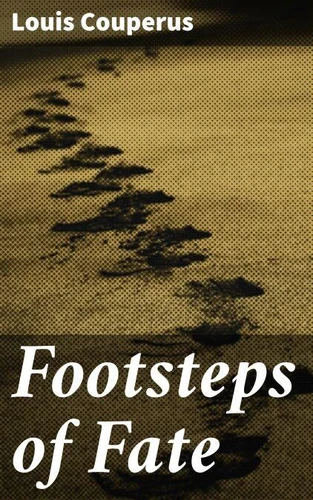Footsteps of Fate. A Tale of Fate, Love, and Betrayal in 19th - Century Europe
Par : ,Formats :
Disponible dans votre compte client Decitre ou Furet du Nord dès validation de votre commande. Le format ePub est :
- Compatible avec une lecture sur My Vivlio (smartphone, tablette, ordinateur)
- Compatible avec une lecture sur liseuses Vivlio
- Pour les liseuses autres que Vivlio, vous devez utiliser le logiciel Adobe Digital Edition. Non compatible avec la lecture sur les liseuses Kindle, Remarkable et Sony
 , qui est-ce ?
, qui est-ce ?Notre partenaire de plateforme de lecture numérique où vous retrouverez l'ensemble de vos ebooks gratuitement
Pour en savoir plus sur nos ebooks, consultez notre aide en ligne ici
- Nombre de pages195
- FormatePub
- ISBN406-4-06-620752-6
- EAN4064066207526
- Date de parution25/04/2021
- Protection num.Digital Watermarking
- Taille730 Ko
- Infos supplémentairesepub
- ÉditeurGOOD PRESS
Résumé
In "Footsteps of Fate, " Louis Couperus masterfully weaves a narrative that explores the intricate interplay of destiny and personal agency amidst the backdrop of early 20th-century Dutch society. The novel is characterized by its lush prose, rich symbolism, and a deeply psychological approach to character development. Couperus delves into the lives of his protagonists, examining how their seemingly trivial choices reverberate through their lives, ultimately unveiling the profound implications of fate.
The fluid narrative style, reflective of the Symbolist movement, invites readers to ponder the existential questions that underpin human experience. Louis Couperus, a prominent figure in Dutch literature, was heavily influenced by his own experiences and the cultural milieu of his time. Born in 1863 in The Hague, his keen observations of societal norms and the moral dilemmas faced by individuals in high society permeate his works.
Having lived abroad and acquainted with various cultural perspectives, Couperus infuses "Footsteps of Fate" with the philosophical depth that reflects both his life journey and eras of rapid social change, particularly the transition towards modernity. This novel is a compelling read for anyone interested in the philosophical inquiries of fate and free will explored through exquisite literary craftsmanship.
Couperus's probing insights into the human condition make "Footsteps of Fate" a timeless reflection on life's uncertainties, making it essential for scholars, students, and lay readers alike.
The fluid narrative style, reflective of the Symbolist movement, invites readers to ponder the existential questions that underpin human experience. Louis Couperus, a prominent figure in Dutch literature, was heavily influenced by his own experiences and the cultural milieu of his time. Born in 1863 in The Hague, his keen observations of societal norms and the moral dilemmas faced by individuals in high society permeate his works.
Having lived abroad and acquainted with various cultural perspectives, Couperus infuses "Footsteps of Fate" with the philosophical depth that reflects both his life journey and eras of rapid social change, particularly the transition towards modernity. This novel is a compelling read for anyone interested in the philosophical inquiries of fate and free will explored through exquisite literary craftsmanship.
Couperus's probing insights into the human condition make "Footsteps of Fate" a timeless reflection on life's uncertainties, making it essential for scholars, students, and lay readers alike.
In "Footsteps of Fate, " Louis Couperus masterfully weaves a narrative that explores the intricate interplay of destiny and personal agency amidst the backdrop of early 20th-century Dutch society. The novel is characterized by its lush prose, rich symbolism, and a deeply psychological approach to character development. Couperus delves into the lives of his protagonists, examining how their seemingly trivial choices reverberate through their lives, ultimately unveiling the profound implications of fate.
The fluid narrative style, reflective of the Symbolist movement, invites readers to ponder the existential questions that underpin human experience. Louis Couperus, a prominent figure in Dutch literature, was heavily influenced by his own experiences and the cultural milieu of his time. Born in 1863 in The Hague, his keen observations of societal norms and the moral dilemmas faced by individuals in high society permeate his works.
Having lived abroad and acquainted with various cultural perspectives, Couperus infuses "Footsteps of Fate" with the philosophical depth that reflects both his life journey and eras of rapid social change, particularly the transition towards modernity. This novel is a compelling read for anyone interested in the philosophical inquiries of fate and free will explored through exquisite literary craftsmanship.
Couperus's probing insights into the human condition make "Footsteps of Fate" a timeless reflection on life's uncertainties, making it essential for scholars, students, and lay readers alike.
The fluid narrative style, reflective of the Symbolist movement, invites readers to ponder the existential questions that underpin human experience. Louis Couperus, a prominent figure in Dutch literature, was heavily influenced by his own experiences and the cultural milieu of his time. Born in 1863 in The Hague, his keen observations of societal norms and the moral dilemmas faced by individuals in high society permeate his works.
Having lived abroad and acquainted with various cultural perspectives, Couperus infuses "Footsteps of Fate" with the philosophical depth that reflects both his life journey and eras of rapid social change, particularly the transition towards modernity. This novel is a compelling read for anyone interested in the philosophical inquiries of fate and free will explored through exquisite literary craftsmanship.
Couperus's probing insights into the human condition make "Footsteps of Fate" a timeless reflection on life's uncertainties, making it essential for scholars, students, and lay readers alike.










